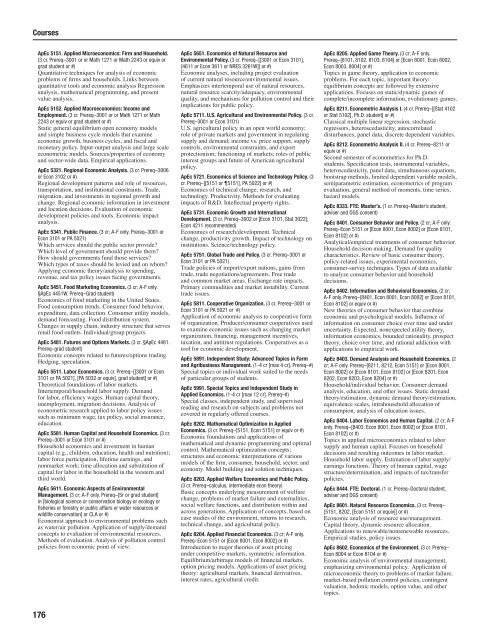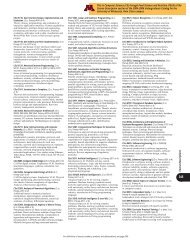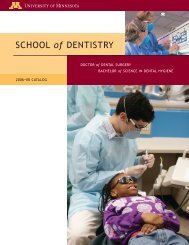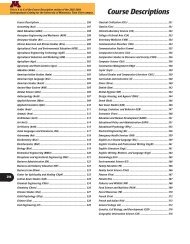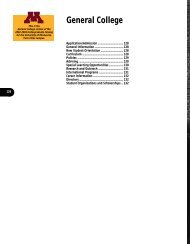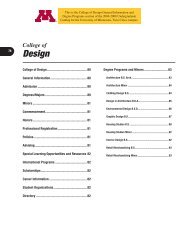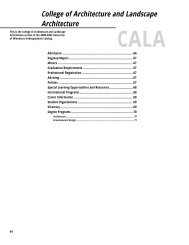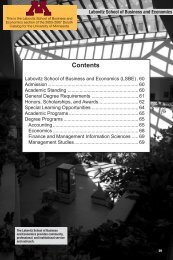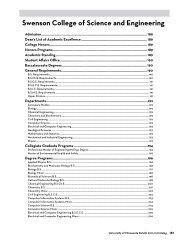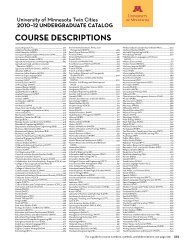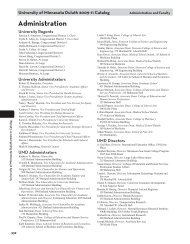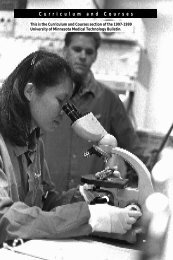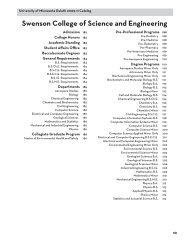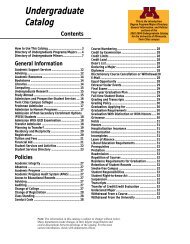Accounting through Education and Human Development - University ...
Accounting through Education and Human Development - University ...
Accounting through Education and Human Development - University ...
Create successful ePaper yourself
Turn your PDF publications into a flip-book with our unique Google optimized e-Paper software.
Courses<br />
ApEc 5151. Applied Microeconomics: Firm <strong>and</strong> Household.<br />
(3 cr. Prereq–3001 or or Math 1271 or Math 2243 or equiv or<br />
grad student or #)<br />
Quantitative techniques for analysis of economic<br />
problems of firms <strong>and</strong> households. Links between<br />
quantitative tools <strong>and</strong> economic analysis Regression<br />
analysis, mathematical programming, <strong>and</strong> present<br />
value analysis.<br />
ApEc 5152. Applied Macroeconomics: Income <strong>and</strong><br />
Employment. (3 cr. Prereq–3001 or or Math 1271 or Math<br />
2243 or equiv or grad student or #)<br />
Static general equilibrium open economy models<br />
<strong>and</strong> simple business cycle models that examine<br />
economic growth, business cycles, <strong>and</strong> fiscal <strong>and</strong><br />
monetary policy. Input-output analysis <strong>and</strong> large scale<br />
econometric models. Sources/properties of economy<br />
<strong>and</strong> sector-wide data. Empirical applications.<br />
ApEc 5321. Regional Economic Analysis. (3 cr. Prereq–3006<br />
or Econ 3102 or #)<br />
Regional development patterns <strong>and</strong> role of resources,<br />
transportation, <strong>and</strong> institutional constraints. Trade,<br />
migration, <strong>and</strong> investments in regional growth <strong>and</strong><br />
change. Regional economic information in investment<br />
<strong>and</strong> location decisions. Evaluation of economic<br />
development policies <strong>and</strong> tools. Economic impact<br />
analysis.<br />
ApEc 5341. Public Finance. (3 cr; A-F only. Prereq–3001 or<br />
Econ 3101 or PA 5021)<br />
Which services should the public sector provide<br />
Which level of government should provide them<br />
How should governments fund those services<br />
Which types of taxes should be levied <strong>and</strong> on whom<br />
Applying economic theory/analysis to spending,<br />
revenue, <strong>and</strong> tax policy issues facing governments.<br />
ApEc 5451. Food Marketing Economics. (3 cr; A-F only.<br />
§ApEc 4451W. Prereq–Grad student)<br />
Economics of food marketing in the United States.<br />
Food consumption trends. Consumer food behavior,<br />
expenditure, data collection. Consumer utility models,<br />
dem<strong>and</strong> forecasting. Food distribution system.<br />
Changes in supply chain, industry structure that serves<br />
retail food outlets. Individual/group projects.<br />
ApEc 5481. Futures <strong>and</strong> Options Markets. (3 cr. §ApEc 4481.<br />
Prereq–grad student)<br />
Economic concepts related to futures/options trading.<br />
Hedging, speculation.<br />
ApEc 5511. Labor Economics. (3 cr. Prereq–[[3001 or Econ<br />
3101 or PA 5021], [PA 5032 or equiv], grad student] or #)<br />
Theoretical foundations of labor markets.<br />
Intertemporal/household labor supply. Dem<strong>and</strong><br />
for labor, efficiency wages. <strong>Human</strong> capital theory,<br />
unemployment, migration decisions. Analysis of<br />
econometric research applied to labor policy issues<br />
such as minimum wage, tax policy, social insurance,<br />
education.<br />
ApEc 5581. <strong>Human</strong> Capital <strong>and</strong> Household Economics. (3 cr.<br />
Prereq–3001 or Econ 3101 or #)<br />
Household economics <strong>and</strong> investment in human<br />
capital (e.g., children, education, health <strong>and</strong> nutrition);<br />
labor force participation, lifetime earnings, <strong>and</strong><br />
nonmarket work; time allocation <strong>and</strong> substitution of<br />
capital for labor in the household in the western <strong>and</strong><br />
third world.<br />
ApEc 5611. Economic Aspects of Environmental<br />
Management. (3 cr; A-F only. Prereq–[Sr or grad student]<br />
in [biological science or conservation biology or ecology or<br />
fisheries or forestry or public affairs or water resources or<br />
wildlife conservation] or CLA or #)<br />
Economist approach to environmental problems such<br />
as water/air pollution. Application of supply/dem<strong>and</strong><br />
concepts to evaluation of environmental resources.<br />
Methods of evaluation. Analysis of pollution control<br />
policies from economic point of view.<br />
ApEc 5651. Economics of Natural Resource <strong>and</strong><br />
Environmental Policy. (3 cr. Prereq–[[3001 or Econ 3101],<br />
[4611 or Econ 3611 or NRES 3261W]] or #)<br />
Economic analyses, including project evaluation<br />
of current natural resource/environmental issues.<br />
Emphasizes intertemporal use of natural resources,<br />
natural resource scarcity/adequacy, environmental<br />
quality, <strong>and</strong> mechanisms for pollution control <strong>and</strong> their<br />
implications for public policy.<br />
ApEc 5711. U.S. Agricultural <strong>and</strong> Environmental Policy. (3 cr.<br />
Prereq–3001 or Econ 3101)<br />
U.S. agricultural policy in an open world economy;<br />
role of private markets <strong>and</strong> government in regulating<br />
supply <strong>and</strong> dem<strong>and</strong>; income vs. price support, supply<br />
controls, environmental constraints, <strong>and</strong> export<br />
protectionism; functioning of markets; roles of public<br />
interest groups <strong>and</strong> future of American agricultural<br />
policy.<br />
ApEc 5721. Economics of Science <strong>and</strong> Technology Policy. (3<br />
cr. Prereq–[[5151 or 5151], PA 5022] or #)<br />
Economics of technical change, research, <strong>and</strong><br />
technology. Productivity. Methods for evaluating<br />
impacts of R&D. Intellectual property rights.<br />
ApEc 5731. Economic Growth <strong>and</strong> International<br />
<strong>Development</strong>. (3 cr. Prereq–3002 or [Econ 3101, Stat 3022];<br />
Econ 4211 recommended)<br />
Economics of research/development. Technical<br />
change, productivity growth. Impact of technology on<br />
institutions. Science/technology policy.<br />
ApEc 5751. Global Trade <strong>and</strong> Policy. (3 cr. Prereq–3001 or<br />
Econ 3101 or PA 5021)<br />
Trade policies of import/export nations, gains from<br />
trade, trade negotiations/agreements. Free trade<br />
<strong>and</strong> common market areas. Exchange rate impacts.<br />
Primary commodities <strong>and</strong> market instability. Current<br />
trade issues.<br />
ApEc 5811. Cooperative Organization. (3 cr. Prereq–3001 or<br />
Econ 3101 or PA 5021 or #)<br />
Application of economic analysis to cooperative form<br />
of organization. Producer/consumer cooperatives used<br />
to examine economic issues such as changing market<br />
organization, financing, management incentives,<br />
taxation, <strong>and</strong> antitrust regulations. Cooperatives as a<br />
tool for economic development.<br />
ApEc 5891. Independent Study: Advanced Topics in Farm<br />
<strong>and</strong> Agribusiness Management. (1-4 cr [max 4 cr]. Prereq–#)<br />
Special topics or individual work suited to the needs<br />
of particular groups of students.<br />
ApEc 5991. Special Topics <strong>and</strong> Independent Study in<br />
Applied Economics. (1-4 cr [max 12 cr]. Prereq–#)<br />
Special classes, independent study, <strong>and</strong> supervised<br />
reading <strong>and</strong> research on subjects <strong>and</strong> problems not<br />
covered in regularly offered courses.<br />
ApEc 8202. Mathematical Optimization in Applied<br />
Economics. (3 cr. Prereq–[5151, Econ 5151] or equiv or #)<br />
Economic foundations <strong>and</strong> applications of<br />
mathematical <strong>and</strong> dynamic programming <strong>and</strong> optimal<br />
control. Mathematical optimization concepts;<br />
structures <strong>and</strong> economic interpretations of various<br />
models of the firm, consumer, household, sector, <strong>and</strong><br />
economy. Model building <strong>and</strong> solution techniques.<br />
ApEc 8203. Applied Welfare Economics <strong>and</strong> Public Policy.<br />
(3 cr. Prereq–calculus, intermediate econ theory)<br />
Basic concepts underlying measurement of welfare<br />
change, problems of market failure <strong>and</strong> externalities,<br />
social welfare functions, <strong>and</strong> distribution within <strong>and</strong><br />
across generations. Application of concepts, based on<br />
case studies of the environment, returns to research,<br />
technical change, <strong>and</strong> agricultural policy.<br />
ApEc 8204. Applied Financial Economics. (3 cr; A-F only.<br />
Prereq–Econ 5151 or [Econ 8001, Econ 8002] or #)<br />
Introduction to major theories of asset pricing<br />
under competitive markets, symmetric information.<br />
Equilibrium/arbitrage models of financial markets,<br />
option pricing models. Applications of asset pricing<br />
theory: agricultural markets, financial derivatives,<br />
interest rates, agricultural credit.<br />
ApEc 8205. Applied Game Theory. (3 cr; A-F only.<br />
Prereq–[8101, 8102, 8103, 8104] or [Econ 8001, Econ 8002,<br />
Econ 8003, 8004] or #)<br />
Topics in game theory, application to economic<br />
problems. For each topic, important theory/<br />
equilibrium concepts are followed by extensive<br />
applications. Focuses on static/dynamic games of<br />
complete/incomplete information, evolutionary games.<br />
ApEc 8211. Econometric Analysis I. (4 cr. Prereq–[[Stat 4102<br />
or Stat 5102], Ph.D. student] or #)<br />
Classical multiple linear regression, stochastic<br />
regressors, heteroscedasticity, autocorrelated<br />
disturbances, panel data, discrete dependent variables.<br />
ApEc 8212. Econometric Analysis II. (4 cr. Prereq–8211 or<br />
equiv or #)<br />
Second semester of econometrics for Ph.D.<br />
students. Specification tests, instrumental variables,<br />
heteroscedasticity, panel data, simultaneous equations,<br />
bootstrap methods, limited dependent variable models,<br />
semiparametric estimation, econometrics of program<br />
evaluation, general method of moments, time series,<br />
hazard models.<br />
ApEc 8333. FTE: Master’s. (1 cr. Prereq–Master’s student,<br />
adviser <strong>and</strong> DGS consent)<br />
ApEc 8401. Consumer Behavior <strong>and</strong> Policy. (2 cr; A-F only.<br />
Prereq–Econ 5151 or [Econ 8001, Econ 8002] or [Econ 8101,<br />
Econ 8102] or #)<br />
Analytical/empirical treatments of consumer behavior.<br />
Household decision making. Dem<strong>and</strong> for quality<br />
characteristics. Review of basic consumer theory,<br />
policy-related issues, experimental economics,<br />
consumer-survey techniques. Types of data available<br />
to analyze consumer behavior <strong>and</strong> household<br />
decisions.<br />
ApEc 8402. Information <strong>and</strong> Behavioral Economics. (2 cr;<br />
A-F only. Prereq–[8401, Econ 8001, Econ 8002] or [Econ 8101,<br />
Econ 8102] or equiv or #)<br />
New theories of consumer behavior that combine<br />
economic <strong>and</strong> psychological models. Influence of<br />
information on consumer choice over time <strong>and</strong> under<br />
uncertainty. Expected, nonexpected utility theory,<br />
information economics, bounded rationality, prospect<br />
theory, choice over time, <strong>and</strong> rational addiction with<br />
applications to empirical work.<br />
ApEc 8403. Dem<strong>and</strong> Analysis <strong>and</strong> Household Economics. (2<br />
cr; A-F only. Prereq–[8211, 8212, Econ 5151] or [Econ 8001,<br />
Econ 8002] or [Econ 8101, Econ 8102] or [Econ 8201, Econ<br />
8202, Econ 8203, Econ 8204] or #)<br />
Household/individual behavior. Consumer dem<strong>and</strong><br />
analysis, education, <strong>and</strong> other issues. Static dem<strong>and</strong><br />
theory/estimation, dynamic dem<strong>and</strong> theory/estimation,<br />
equivalence scales, intrahousehold allocation of<br />
consumpion, analysis of education issues.<br />
ApEc 8404. Labor Economics <strong>and</strong> <strong>Human</strong> Capital. (2 cr; A-F<br />
only. Prereq–[8403, Econ 8001, Econ 8002] or [Econ 8101,<br />
Econ 8102] or #)<br />
Topics in applied microeconomics related to labor<br />
supply <strong>and</strong> human capital. Focuses on household<br />
decisions <strong>and</strong> resulting outcomes in labor market.<br />
Household labor supply. Estimation of labor supply/<br />
earnings functions. Theory of human capital, wage<br />
structure/determination, <strong>and</strong> impacts of tax/transfer<br />
policies.<br />
ApEc 8444. FTE: Doctoral. (1 cr. Prereq–Doctoral student,<br />
adviser <strong>and</strong> DGS consent)<br />
ApEc 8601. Natural Resource Economics. (3 cr. Prereq–<br />
[5151, 8202, [Econ 5151 or equiv]] or #)<br />
Economic analysis of resource use/management.<br />
Capital theory, dynamic resource allocation.<br />
Applications to renewable/nonrenewable resources.<br />
Empirical studies, policy issues.<br />
ApEc 8602. Economics of the Environment. (3 cr. Prereq–<br />
Econ 8004 or Econ 8104 or #)<br />
Economic analysis of environmental management,<br />
emphasizing environmental policy. Application of<br />
microeconomic theory to problems of market failure,<br />
market-based pollution control policies, contingent<br />
valuation, hedonic models, option value, <strong>and</strong> other<br />
topics.<br />
176


